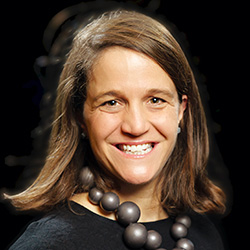Faculty DirectoryElizabeth Gerber

Professor of Mechanical Engineering and (by courtesy) Computer Science
Professor of Communication Studies
Co-Director, Center for Human Computer Interaction + Design
Contact
2133 Sheridan RoadFord 2-327
Evanston, IL 60208-3109
847-467-0607Email Elizabeth Gerber
Website
Departments
Affiliations
Master of Science in Engineering Design and Innovation Program (EDI)
Education
Ph.D. Management Science & Engineering, Stanford University, Palo Alto, CA
M.S. Product Design, Mechanical Engineering, Stanford University, Palo Alto, CA
B.A. Art and Engineering, Dartmouth College, Hanover, NH
Research Interests
In the face of increasingly complex challenges like healthcare access and environmental collapse, we need dramatic and sustained innovation. The driving question behind my research is how new technology can support the innovation process. In particular, I examine what I define as collective innovation , an innovation process that harnesses the diverse and untapped human, social, and economic capital from distributed networks to discover, evaluate, and implement new ideas (Ger ber et al., 2019) . Open, ubiquitous social technical infrastructure supports collective innovation, affording greater speed and deeper and broader participation . While collective innovation has the potential to massively transform society, it is poorly understood. I use qualitative, quantitative, and design research methodologies to establish theory, contribute design principles, and develop infrastructure for collective innovation. My pioneering scholarship leads the academy's understanding of this fast-evolving, scalable infrastructure, and directly contributes to its improved functioning to benefit society at large.
The first premise of collective innovation is that direct interaction between stakeholders can radically enhance rates of innovation (Gerber et al. , 2019; Foong et al., 2017; Gerber and Hui, 216; Gerber, 2014; Gerber and Hui, 2013; Gerber and Carroll, 2012). The second premise is that even across weakly connected, heterogeneous networks, changes in the design of our infrastructure can bring forth effort and resources that would otherwise lie fallow (Foong et al., under review; Hui et al., 2018; Gerber, 2014; Shaw et al, 2014 , Hui et al., 2014; Gerber, 2007). The third premise is that broader participant engagement can expand the breadth of problems addressed and increase the quality of the solutions (Gerber, 2014; Gerber, 2007). This work is embodied in the four ongoing major endeavors of my r esearch career: Crowdfunding, Crowdsourcing, S ocial Innovation Networks, and Design for America.
My scholarship produces three types of results: 1) theory for collective innovation, 2) design principles, and 3) novel sociotechnical systems to support inclusive and continuous innovation in society. My work has resulted in 60 publications in the Computer Supported Cooperative Work and Social Computing, Computer Human Interaction, and Management literatures and ACM Interactions and IEEE Internet Computing trade publications. My research has been highlighted in the press including the Wall Street Journal, Harvard Business Review, Wired, National Public Radio’s Marketplace and generously and consistently supported by the National Science Foundation (NSF), National Collegiate Inventors and Innovators Alliance, Hastac (sponsored by the MacArthur and Mozilla Foundations), Watson Foundation, Adobe, and Microsoft.
Significant Professional Service
- Adviser, Design for America
- Co-Director, Center for Human-Computer Interaction + Design
Selected Publications
- Foong, Eureka; Gerber, Elizabeth M., Understanding gender diferences in pricing strategies in online labor marketplaces, Association for Computing Machinery (2021).
- Gerber, Elizabeth M.; Nickerson, Jeffrey V.; Dontcheva, Mira; Dabbish, Laura; Hill, Charlie, Collective innovation, Association for Computing Machinery:106-110 (2019).
- Kreitzberg, Charles B.; Shneiderman, Ben; Gerber, Elizabeth; Rosenzweig, Elizabeth; Churchill, Elizabeth F., Careers in HCI and UX, Association for Computing Machinery (2019).
- Foong, Eureka; Vincent, Nicholas; Hecht, Brent; Gerber, Elizabeth M., Women (still) ask for less, Proceedings of the ACM on Human-Computer Interaction 2(CSCW) (2018).
- Hui, Julie; Gerber, Elizabeth M.; Dombrowski, Lynn; Gray, Mary L.; Marcus, Adam; Salehi, Niloufar, Computer-supported career development in the future of work, Association for Computing Machinery:133-136 (2018).
- Hui, Julie S.; Easterday, Matthew W.; Gerber, Elizabeth M., Distributed Apprenticeship in Online Communities, Human-Computer Interaction 34(4):328-378 (2018).
- Easterday, Matthew W.; Gerber, Elizabeth M.; Rees Lewis, Daniel G., Social innovation networks, Design Issues 34(2):64-76 (2018).
- Hui, Julie S.; Gergle, Darren; Gerber, Elizabeth M, IntroAssist, Association for Computing Machinery (2018).
- Gerber, Elizabeth M; Fu, F., Improv for Designers, Springer International Publishing AG (2018).
- Carlson, Spencer E.; Rees Lewis, Daniel G.; Gerber, Elizabeth M.; Easterday, Matthew W., Challenges of peer instruction in an undergraduate student-led learning community, Instructional Science 46(3):405-433 (2017).
- Hui, Julie S.; Gerber, Elizabeth M, Developing makerspaces as sites of entrepreneurship, Association for Computing Machinery:2023-2038 (2017).
- Rees Lewis, Daniel G.; Easterday, Matthew W.; Harburg, Emily; Gerber, Elizabeth M.; Riesbeck, Christopher K., Overcoming barriers between volunteer professionals advising project-based learning teams with regulation tools, British Journal of Educational Technology 49(3):354-369 (2017).
- Easterday, Matthew W.; Rees Lewis, Daniel G.; Gerber, Elizabeth M., The logic of the theoretical and practical products of design research, Australasian Journal of Educational Technology 32(4):125-144 (2016).
- Yen, Yu Chun Grace; Dow, Steven P.; Gerber, Elizabeth; Bailey, Brian P., Social network, Web forum, or task market? Comparing different crowd genres for design feedback exchange, Association for Computing Machinery, Inc:773-784 (2016).
In the Classroom
Professor Gerber's teaching interests include design, innovation management, and organizational behavior. At Northwestern she teaches undergraduate and graduate classes on product and service design which emphasizes the design thinking methodology - a human centered problem solving approach focused on gaining inspiration from human needs, working in diverse groups to generate ideas, and prototyping ideas for rapid feedback. She also advises students in the award winning design initiative she founded called Design for America where students take on extracurricular design work to make social and local impact.
Liz Gerber in the News
Design for America wins Smithsonian's Cooper Hewitt Design Award
Launch of Center for Human-Computer Interaction + Design
Liz Gerber receives Meshii Award for Excellence in Design Education